GoDaddy Review Can You Trust Their Shared Hosting?
Tooltester is supported by readers like yourself. We may earn an affiliate commission when you purchase through our links, which enables us to offer our research for free.
According to BuiltWith, 1 in every 20 websites seems to be hosted on GoDaddy. Undeniably, they are a web hosting titan, with around 20 million customers, over 9,000 employees and more than 80 million domains managed.
But this is not a popularity contest...
… Instead, I am about to review GoDaddy, so that you know what to expect from their performance, what the deal is with their support and how much it will really cost you - spoiler alert, their pricing can get confusing.
You can check out our video-review if you don't want to read the full review:
Let's dive in now.
What Products Does GoDaddy Offer?
GoDaddy offers dozens of products and comes with many available plans. So, first let me tell you a bit more about their hosting offer.
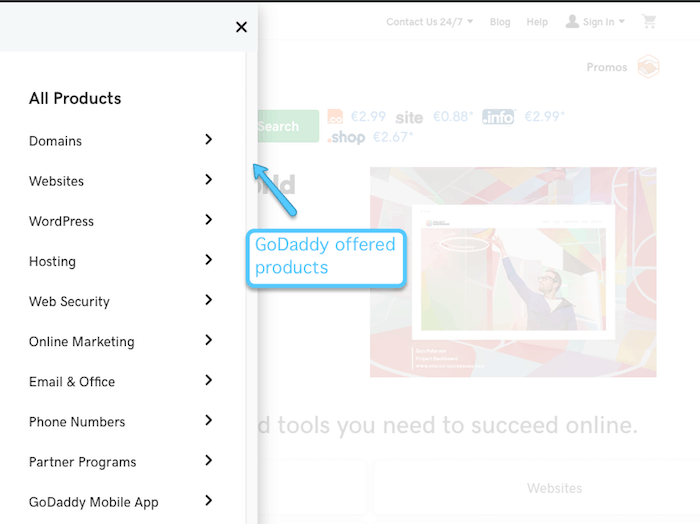
- GoDaddy is one of the largest domain name registrars. With them you can get almost any domain extension you are looking for: .com, .net, .org, .law or even .today. A .com domain will cost you $14.99 the first year and $19.99 after, not the cheapest (domain name prices vary).
- At GoDaddy, there are shared hosting plans available too. It’ll cost you between $8.99 and $24.99 at renewal. With this type of hosting service, you’ll share a server with other clients. It’s suitable for small and medium projects that don’t need top-performing servers.
- Like many other hosting providers, GoDaddy has a WordPress optimized shared hosting service. They seem to prepare their servers for a higher WordPress performance, offer WordPress pre-installed and have a selection of themes available. Nothing too exciting if you ask me. It starts at $9.99 a month when you renew.
- GoDaddy VPS plans are for those with special server configuration needs. With the root (administrative) access you’ll be able to configure your server to your preferences. They also come with a higher performance than shared hosting plans. VPS plans at GoDaddy start at $6 a month (self-hosted) and can go all the way up to around $100 per month.
- If the higher performance of a VPS is not enough for your site, a dedicated hosting package is your best next option. With these, you’ll have your own server for yourself and won’t have neighbors interfering with your project. But you’ll need a budget for that, as dedicated servers start at $130 per month at GoDaddy.
- GoDaddy also offers email hosting plans, so you can have a professional-looking address like [email protected]. They start at $5.99 per user per month for 10 GB of email storage.
- For the less tech-savvy users, they also have a website builder to create your site with. To be honest, it’s not my favorite site builder as some features come up a bit short (e.g. the blog). Other alternatives like Weebly, Wix or Squarespace seem to me more well-rounded.
But their offering doesn’t stop there, among others they also have a hosting reseller program so you can sell hosting plans to your clients, web design services and SEO consulting.
GoDaddy Pricing
Economy
Deluxe
Ultimate
Maximum
Price Increases on Renewal
The prices above are the cost per month (if you pay for a year in advance), once the introductory prices end (after the first year).
Almost all web hosting providers make very low-priced introductory offers for the first year, to lure you in. Your plan will automatically renew at a higher rate after the first year, and the higher rate is what you will pay from then on.
Since these higher rates are what you will continue to pay (and since the introductory offers vary widely), when comparing different providers, it is always best to look at the renewal prices.
In the chart below, you can see the different introductory prices compared to the renewal prices of all the hosting providers we test.
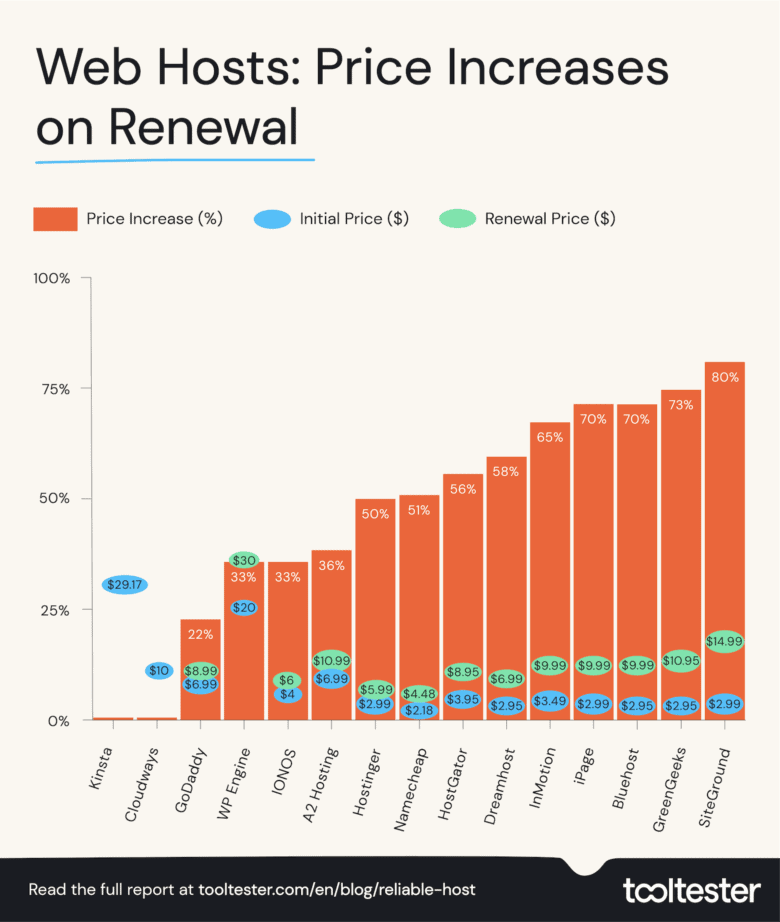
As you can see, although GoDaddy’s introductory prices may seem quite high compared to other providers, the increase on renewal is quite modest.
So in the end, GoDaddy woks out a little bit cheaper than a lot of the competition.
What Do Their Shared Plans Include?
| Economy | Deluxe | Ultimate | Maximum | |
|---|---|---|---|---|
| Websites | 1 site | 10 sites | 25 sites | 50 sites |
| Support | 24/7 | 24/7 | 24/7 | 24/7 |
| CPU
Memory |
1 CPU 512 MB |
1 CPU 1 GB |
2 CPUs 1.5 GB |
2 CPUs 2 GB |
| Max. files amount | 250,000 | 250,000 | 250,000 | 250,000 |
| Bandwidth | Unmetered * | Unmetered * | Unmetered * | Unmetered * |
| Storage | 25 GB | 50 GB | 75 GB | 100 GB |
| Database
Max. DB size |
10 1 GB |
25 1 BG |
50 1 GB |
100 1 GB |
| SSL certificate | Yes | Yes | Yes | Yes |
| Backup | Paid add-on | Paid add-on | Paid add-on | Paid add-on |
| First-year special price | $5.99 a month | $7.99 a month | $12.99 a month | $19.99 a month |
| Renewal price | $8.99 a month | $11.99 a month | $16.99 a month | $24.99 a month |
* Even if officially they don’t limit the traffic you can get, if your website gets too much traffic or uses too many resources, they’ll request that you upgrade. For more information, check our article on GoDaddy pricing.
The Economy plan is for those only looking to host 1 website (1 domain) and don’t need more than 25 GB of storage. It also comes with a database limitation of 10. An SSL certificate is included now, though.
The Deluxe tier comes with the same specs and features as the Economy package, but you’ll be able to host 10 sites and have 50 GB of storage. It also comes with free SSL certificates now.
If you need a higher performance (e.g. 2 CPUs and 1.5 GB of memory) you can purchase the Ultimate plan. It also comes with free SSL certificate for all your sites. 25 sites and 75 GB of storage are allowed.
With the Maximum tier, you’ll get 2 GB of memory, 50 sites and 100 GB of storage.
I don’t like that some basic features you’ll need aren’t included with the shared hosting plans. For example, if you want to have your sites backed up, it’ll cost you around $3 extra a month for 5 GB of storage.
GoDaddy Review: Pros & Cons
- Pros
- Cons
Pros
-
Easy to use
I find their interface pretty intuitive to use, I would recommend it for beginners.
-
Speed
In my latest speed tests, GoDaddy performed really well and was one of the fastest web hosting providers.
-
Uptime
GoDaddy’s uptime is not the best one, but it’s reliable (more information below).
-
Windows servers
GoDaddy also offers Windows-based hosting.
-
Bandwidth
The traffic your site can get with each plan won’t be limited.
But you are probably wondering when is it a good idea to use GoDaddy and when it’s not. Let me give you a couple of examples.
When to Use GoDaddy’s Hosting?
First of all, you should set aside some budget for hosting, as GoDaddy comes out a bit pricey, especially when you start adding the basic add-ons.
I would suggest GoDaddy’s shared hosting for those looking for a host that’s very generous with the storage (but don’t need unlimited space) and doesn’t measure your traffic.
GoDaddy also offers Windows-based hosting services, this may be a good argument to convince some.
When Not to Use GoDaddy’s hosting?
I would not suggest GoDaddy if you need an affordable hosting provider, check DreamHost, GreenGeeks or our round up of the best cheap web hosts instead.
And if you’re specifically looking for affordable WordPress hosting, check out our guide to the best low cost hosting providers for WordPress websites.
In our tests, GoDaddy has also proved to be a reliable hosting provider, but it wasn’t the top-performing service. So serious projects like avid bloggers should consider other alternatives like SiteGround or GreenGeeks.
Finally, those looking for advanced options like staging areas, server-side caching or CMS (e.g. WordPress) optimization options may want to check out other alternatives.
GoDaddy Shared Hosting Details
* All your files combined (storage, databases, emails, etc), can’t be more than 250,000.
GoDaddy Performance Tests
I checked GoDaddy’s performance to see if they are a reliable hosting provider. I’ve tested their uptime and speed using several tools: StatusCake, Pingdom, GTmetrix and Google PageSpeed Insights.
GoDaddy Speed Test
No one wants to have a slow hosting provider. Website visitors hate having to stare at a blank page that never seems to load.
This can cost you conversions, as visitors will go elsewhere if they have to wait too long to read your content. And of course, the faster your website, the higher search engines will rank it. So, website load times matter!
As you can see in the chart below, GoDaddy performed really well in our latest web host speed tests, with an average page load time of just 1.44 seconds.
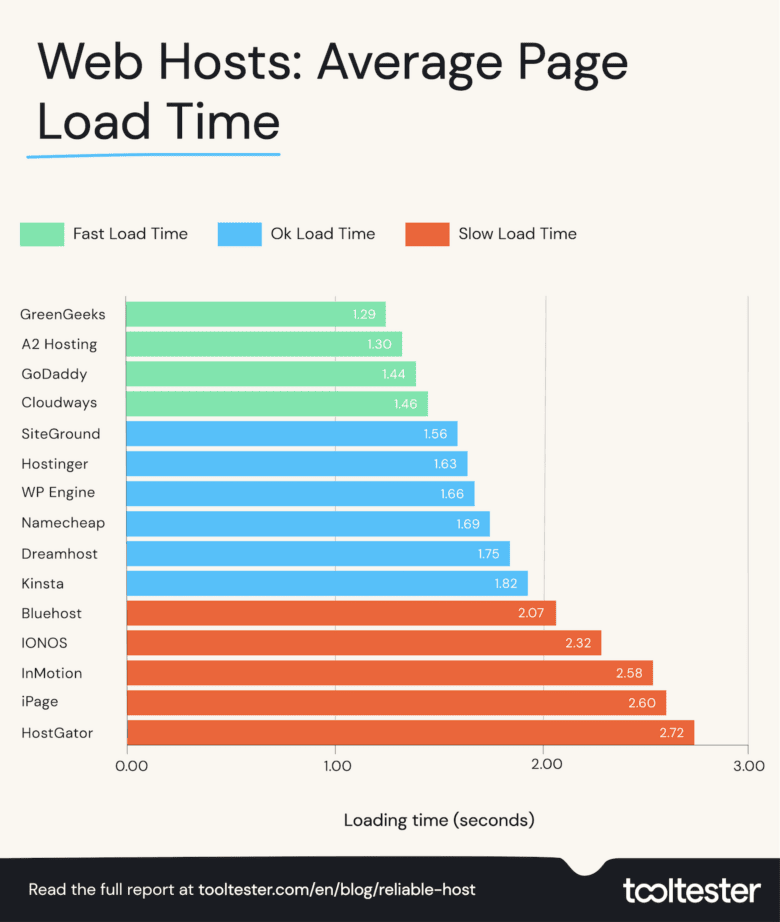
However, that hasn’t always been the case, as you can see in the speed results from the last three years in the table below:
| 2020 | 2021 | 2022 | |
|---|---|---|---|
| Page Load Time in Seconds | |||
| GreenGeeks | 2.39 | 1.56 | 1.29 |
| A2 Hosting | 3.15 | 2.01 | 1.30 |
| GoDaddy | 3.40 | 1.94 | 1.44 |
| Cloudways | 2.32 | 1.73 | 1.46 |
| SiteGround | 2.14 | 1.54 | 1.56 |
| Hostinger | 4.19 | 1.61 | 1.63 |
| WP Engine | 2.21 | 1.65 | 1.66 |
| Namecheap | – | 1.60 | 1.69 |
| Dreamhost | 3.28 | 1.84 | 1.75 |
| Kinsta | 2.98 | 1.77 | 1.82 |
| Bluehost | 3.07 | 2.87 | 2.07 |
| IONOS | – | 1.95 | 2.32 |
| InMotion | 4.36 | 2.75 | 2.58 |
| iPage | 4.19 | 2.76 | 2.60 |
| HostGator | 3.77 | 2.78 | 2.72 |
Results in seconds
The chart below compares the renewal price of different hosting companies to the average page loading speeds that they provided in our tests.
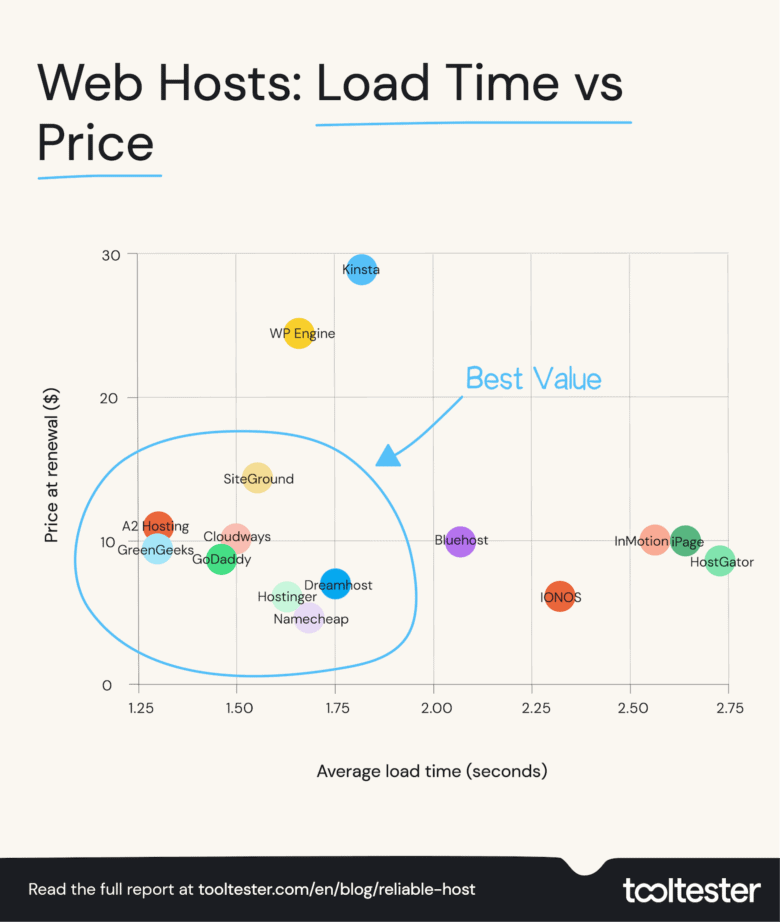
As you can see, GoDaddy did very well, providing the third-fastest load times for prices that are lower than most of the other hosting companies!
While there are several steps you can take yourself to make WordPress faster and fix a slow website, a fast web host is the biggest contributor to the speed of your website.
So this is a big bonus for GoDaddy!
GoDaddy Uptime Test
Uptime measures how much time your website was online. Believe it or not, hosting providers can’t always guarantee that your site will be online 100% of the time.
Having a 99.95% uptime (or 0.05% downtime) is considered a good result. So if you are serious about your website, you should always aim for this. Otherwise, you may get punished by search engines and of course you’ll be offering a poor user experience to your visitors.
You can see the result of this year’s web host uptime tests in the chart below. GoDaddy did OK, with an uptime score of 99.95%.
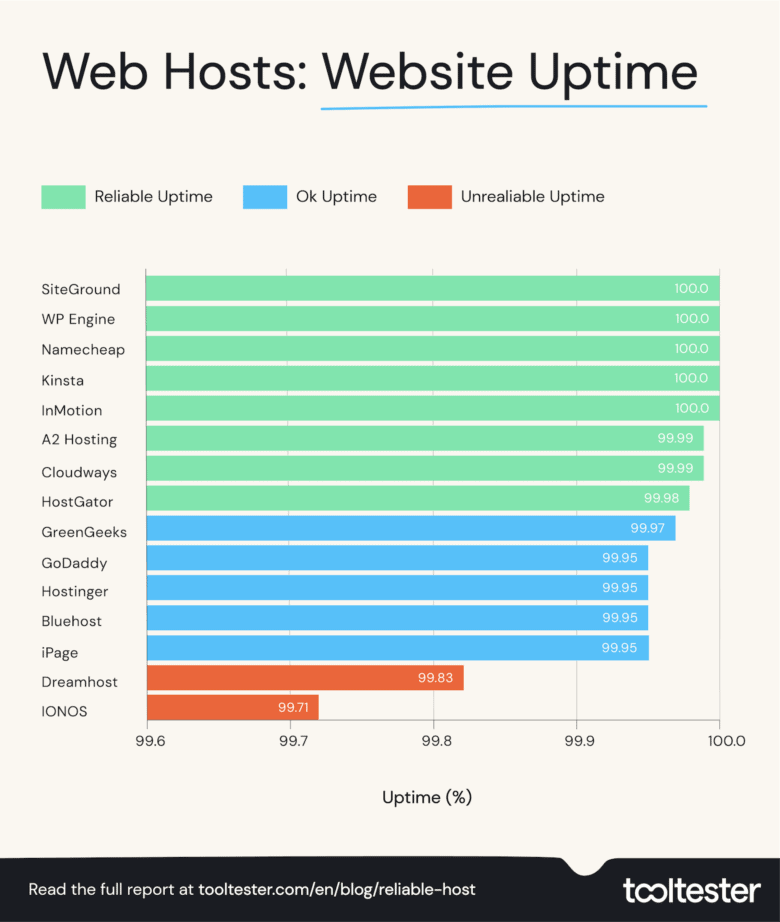
You can compare this year’s result to the previous two years in the table below:
| 2020 | 2021 | 2022 | |
|---|---|---|---|
| Uptime % | |||
| SiteGround | 99.97 | 100 | 100 |
| WP Engine | 99.99 | 99.99 | 100 |
| Namecheap | – | 100 | 100 |
| Kinsta | 100 | 100 | 100 |
| InMotion | 99.73 | 99.95 | 100 |
| A2 Hosting | 99.99 | 99.98 | 99.99 |
| Cloudways | 100 | 100 | 99.99 |
| HostGator | 99.91 | 99.99 | 99.98 |
| GreenGeeks | 99.98 | 99.98 | 99.97 |
| GoDaddy | 99.90 | 99.96 | 99.95 |
| Hostinger | 99.48 | 99.92 | 99.95 |
| Bluehost | 99.96 | 99.99 | 99.95 |
| iPage | 98.45 | 99.85 | 99.95 |
| Dreamhost | 99.99 | 99.96 | 99.83 |
| IONOS | – | 99.93 | 99.71 |
To monitor uptime I use StatusCake, a tool that checks each website every 5 minutes.
GoDaddy has done OK for the past two years after a slightly poor performance in 2020. There are much better (and worse), web providers in terms of uptime than GoDaddy, though.
GoDaddy Review: Do I Recommend It?
Overall, I think GoDaddy offers a solid product to host small websites. I liked:
- Their decent speed
- Apart from classic Linux hosting, they also offer Windows-based hosting services – not many providers do
- Their easy to follow and intuitive interface
- Their unlimited bandwidth and generous storage
However, it has a couple of hidden downsides that you should know about. Some basic features like backups aren’t included in their already pricey plans – in the end, GoDaddy can get expensive.
Advanced features like staging areas are also missing, and they don’t offer migration services for new accounts. This may be a deal-breaker for developers or agencies. Sadly, it’s less than stellar uptime record makes this provider not a good choice for larger sites.
> Try GoDaddy 30 days without risk or read more in our guide to the best web hosting!
I hope you found this GoDaddy review interesting. But if you have any question, please leave comment and I’ll try to help you out.
GoDaddy Alternatives
I think most projects could be hosted using GoDaddy without serious issues (if the backup add-on and SSL are added). However, this doesn’t mean that GoDaddy is the best option for your project.
Let me go over a couple of scenarios so you can compare GoDaddy to other alternatives:
- I would say that DreamHost and A2 Hosting offer the best price to quality ratio
- I’ve found the best support at SiteGround, DreamHost and InMotion, no doubt about that.
- GreenGeeks and A2 Hosting are the top performing providers for speed.
- SiteGround is the best performing, affordable provider for uptime.
- For those needing a hosting provider with a lot of WordPress features (e.g. staging and speed optimization), I would recommend to check SiteGround out.
> But, if you still want to go with GoDaddy, you can try GoDaddy 30 days without risk
We keep our content up to date
15 Mar 2022: New GoDaddy plans limitations and features
17 Sep 2021: Performance update and new rating
08 Oct 2020: General update and new rating due to bad uptime
12 Jul 2019: First review
THE BEHIND THE SCENES OF THIS REVIEW
This article has been written and researched following a precise methodology.
Our methodology








Comments